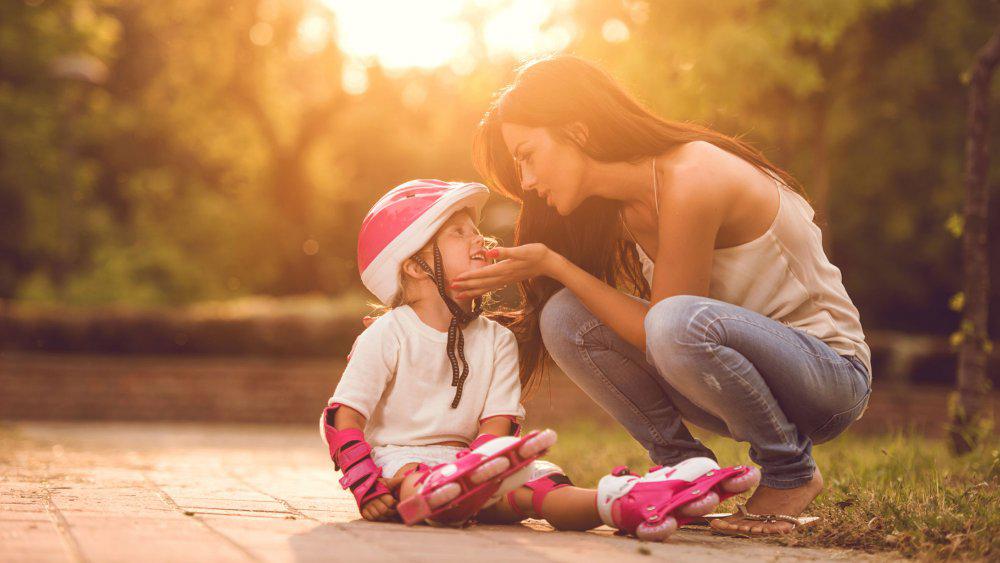Most toddle falls do not cause significant injuries.But in the event of a serious accident, it is essential to remain calm, to assess the situation, and to request emergency care.Some symptoms should be taken care of as soon as possible.All our advice for reacting well.
Between 0 and 6 years old, the fall is the most frequent accident (source 1).A baby can fidget a lot, and it is quite frequent that it falls from a bed during the nap or at night.Even if this type of fall can be scary, it is rare that it causes serious damage.However, injuries remain possible, and it is important to assess the symptoms indicating a need for care by health professionals.
How to react when baby falls?
The first thing to do is to assess the situation.The most important thing is to keep calm as far as possible, even if it is very difficult, and to carefully examine signs of injury.If you are alone, do not hesitate to call a loved one to help you.It must not be wasting time, because reacting quickly is essential.
In the case of a serious fall and a head injury or spine, do not move the baby (except in the event of danger).If the baby vomits or has convulsions, turn it gently on the side.Make sure you keep your neck straight while turning it over.If the baby shows no visible sign of injury and does not seem to act differently, watch him closely.
Rest assured, and examine it at the head, arms, legs, chest and back.Intuition remains a very powerful weapon: if you feel that something is wrong, take your toddler to the doctor.
How do you know if baby is going well after a fall?
First of all, rest assured: the vast majority of falls do not have aggravation.However, there are alert signs that must be monitored.

If one or more of these signs appear in the hours or even in the following days, immediately call for help, or bring it to the emergency room.He could present a head trauma.
The younger your child, the more vulnerable he is.In addition, it is more difficult to assess the condition of an infant (between 0 and 3 months), and to detect alert signs in a baby of this age.It is therefore better to go to the emergency room immediately after the fall.Likewise, up to 1 year, a consultation can impose itself, even if it seems to go.
À lire aussiHow to monitor a baby who has just fallen on the head?What to do ?
In most cases, the shocks and these blows to the head are without gravity.However, it may happen that a more severe blow causes complications.First of all, check the pains of pain and the rest of the body to see if it hurts somewhere or if it has blues.Examine his neck well.
If it is unconscious, immediately call for help.
If your child has normal behavior in the hours that follow, and does not develop the signs described above, the National Institute of Public Health of Quebec (Source 2) still advises to observe it:
Protective helmets were created for babies from 7 months to 3 years to avoid their head shocks in the event of a fall.A helmet of this type is not always easy to wear for a child: he can hinder him in his movements, etc.Do not fall into paranoia and do not put him permanently, or if he refuses.Choose certain moments of games, and in the most "risk" situations.
À lire aussiBaby fall: how to prevent domestic accidents?
During his first months, your child can fall from the high chair, the sofa or the changing table.When he starts to move and then walking, your child can fall on the stairs or a window.
Prevention remains the best way to limit accidents.Never leave a baby on an unattended adult bed, even if pillows are in place to prevent him from approaching the edge.Do not place a car seat or an inflatable seat on a raised surface, even after attaching the baby.
Finally, put the baby in a suitable bed, whose mattress and sheet are well adjusted, without adding plush, cushions, nor bumper that could suffocate it.In general, always take your child with you, if you have to move away, even a short time.
The changing table, the sofa, the car seat, the high chair and the stroller are the main places from which babies can fall.
Also be vigilant with windows and balconies: install safety devices limiting the opening of windows to your child and prevent access to the balcony.
Source 1: "Children 0-6 years - Protect your child from domestic accidents", Ministry of Solidarity and Health.
Source 2: "Better living with our child of pregnancy at two years", National Institute of Public Health of Quebec.
A lire aussiAuteur : SElena BizzottoArticle mis à jour par Mathilde Pujol, Journaliste santé







